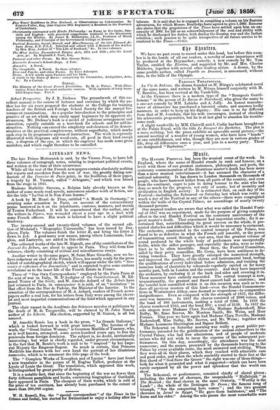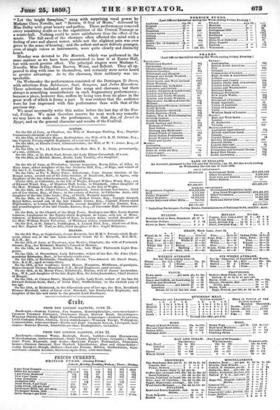331 n 51t.
The HANDEL Tharrrvet, has been the musical event of the week. In England, where the name of Handel stands in rank and honour, on a level with those of our greatest -statesmen, philosophers, and poets, the centenary commemoration of the illustrious master's death has been more than a mere musical entertainment—it has assumed the character of a national solemnity,. It has drawn to London thousands on thousands of people, who have hastened hither from all parts of the country, and even from the continent, eager to join in doing honour to the man who has done so much for the progress, not only of music, but of morality and civilization in English society. It is estimated that, on each day of the Festival—including the Rehearsal on Saturday last which was really, as much a day of the Festival as any of the others—there were congregated within the walls of the Crystal Palace, an assemblage of nearly twenty thousand persons. Our musical readers are aware that what was called the Handel Festi- val of 1857 was an experiment, made for the purpose of giving complete effect to the real Handel Festival on the centenary anniversary of the great master's death. That experiment had important results ; for it as- certained that, notwithstanding its great success on the whole, it pre- sented obstacles and difficulties which it would be necessary to surmount. The orchestra, constructed in the central transept of the Palace, was found to be so defective in what the French call sonorite, or the power of transmitting sound through a vast area, that the greatest volume of sound produced by the whole body of performers was unexpectedly feeble, while the softer passages, and especially the solos were so indis- tinct as to be often inaudible. Since then, the Festival Committee, aided by their privy councillor, Mr. Costa have been assiduous in de- vising remedies. They have greatly enlarged the numerical strength, and improved the quality, of the chorus and instrumental band, testing the qualifications of every individual before admission, and training the immense body of choristers by rehearsals regularly carried on for many months past, both in London and the country. And they have improved the orchestra, by enclosing it at the back and sides and covering it in. These measures have entirely succeeded. The central transept is now, Unquestionably, the greatest and finest concert hall in existence; and the tuneful host assembled within it ou this occasion was such as to re- duce all previous musters of this kind—even the Handel Commemora- tions in Westminster Abbey, once deemed so stupendous—to comparative insignificance. Even as compared with the strength of 1857, the differ- ence was immense. In 1857 the choms consisted of 2000 voices, and the band of 386 instruments, making a total of 2386. In 1859 the chorus numbered 2765, and the band 393; a total of 3158. In 1857 the solo singers were Madame Clara Novello, Madame Rudersdorff, Miss Dolby, Mr. Sims Reeves, Mr. Montem Smith, Mr. Weiss, and Herr Formes. This year we have again had Madame Clara Novello, Madame RudersdotA Miss Dolby, Mr. Reeves, and Mr. Weiss; together with Madame Lemmens Sherrington and Signor Belletti.
The Rehearsal on Saturday morning was really a great public per- formance, intended for the gratification of the annual subscribers to the Crystal Palace, who had free admissions, and of people of moderate means who did not wish to incur the expense of the subsequent per formances. On this day, accordingly, the attendance was the most numerous; and the scenes, presented by the thousands hurrying to the Palace by every available route, the most animated and striking. When they were all in their places, which they reached with admirable case and good order, and when the whole assembly started to their feet at the first chord of" God Save the Queen" the sight was one of those things— both for what it presented and what it suggested—which can have been rarely surpassed by all the power and splendour that the world can show.
The Rehearsal, or performance, consisted chiefly of choral pieces; including the chorus of choruses, the unspeakable " Hallelujah " in The Messiah ; the final chorus in the same Oratoria, "Worthy is the Lamb" ; the whole of the Dettingen Te 1)eum ; the famous song of triumph, "See the conquering hero comes " ; and the two greatest choruses in Israel in Egypt, He gave them hailstones," and The horse and his rider." Among the solo pieces the most remarkable were "Let the bright Seraphim," sung with surprising vocal power by Madame Clara Novell°' and "Return, 0 God of Hosts," delivered by Miss Dolby with great beauty and pathos. These performances removed every remaining doubt as to the capabilities of the Central Transept as a music-hall. Nothing could be more satisfactory than the effect of the music. The full swell of the choruses often affected the mind with a feeling of awe and almost terror, while not the slightest pain was ever given to the sense of hearing ; and the softest and most delicate passages, even of single voices or instruments, were quite clearly and distinctly heard. Monday was devoted to The Messiah, which was performed in the same manner as we have been accustomed to hear it at Exeter Hall, but with much greater effect. The principal singers were Madame C. Novelle, Miss Dolby, Sims Reeves Weiss, and BeRetti. They all ap- peared to sing with ease to themselves, and certainly were never heard to greater advantage. As to the choruses, their sublimity was un- speakable. On Wednesday the performances consisted of the Dettingen Ti' Deum, with selections from Belsha=ar' Saul, Sampson, and Judas Maemsheus. These selections included several fine songs and choruses; but there always is something unsatisfactory in such fragmentary performances ; because a piece, however fine, suffers by being torn from its place in the great work of which it forms a part. It was evident that the audience were far less impressed with this performance than with that of the previous day. We must necessarily write this notice before the last day of the Fes- val, Friday. We must therefore reserve for next week any remarks we may have to make on the performance, on that day, of Israel in Egypt, and on the general character and results of the Festival.

























 Previous page
Previous page